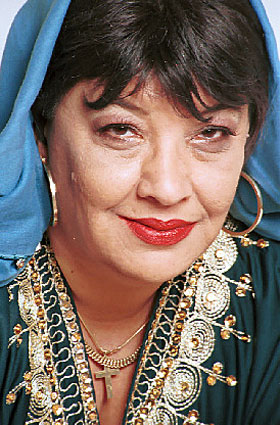Spanish booking agent Yolanda Agudo and manager and producer Dragi Sestic, reported today the death of renowned Gypsy singer Ljiljana Buttler. “Our consolation will always be her music, the immortal part that she left us as a legacy,” said Yolanda Agudo and her partner Ruben Caravaca. “We will never forget her. Her musical career started late… and death took her away too early.”
Ljiljana Buttler was born in Belgrade (in the former Yugoslavia) 1944. Her father was an accordion virtuoso and her mother a Croatian singer. But her father left soon after she was born and her mother had to support herself and her child, singing in bars. They settled in Bijeljina, a small town in Bosnia. One night, her mother fell ill and Ljiljana went to the café and said “My mother can’t come tonight, she’s sick. Please let me sing.” She was only 12 but had learned at her mother’s side. A year later her mother left and Ljiljana was on her own – she continued singing in cafes to support herself through school.
Then she headed for Belgrade. “I started singing in bars in Skadarlia (the famous restaurant quarter)”, she remembered. “The atmosphere was fantastic. The people laughed and cried during the music. That always inspired me – that and strong sljivovica (plum brandy), lots of sad loves and lots of emotion and romance. Sometimes we made recordings for Radio Belgrade. They simply came to the cafes, listened to the music and if they liked it, asked the musicians back to the radio to record”.
From 1980 Ljiljana started doing concerts and became well-known on TV until the political and musical mood started changing during the Milosevic era. “Even before the war, I realized that somehow the joy had vanished and the Balkan men were no longer interested in love stories. Suddenly it became important to wear a short skirt and flash your cleavage. The shorter the skirt, the better singer you were thought to be. I realized my time was over. It was a time for weapons and hatred. It affected me terribly and the war that followed has left scars that will last forever.”
In 1987 the famous Roma (Gypsy) artist disappeared from the Balkan music scene in which she played such a dominant role, leaving music lovers wondering about her inexplicable disappearance. In 2002 she decided to return to her native soil and recorded a new album on the Connecting Cultures label. In recent years she was also involved in the successful Mostar Sevdah Reunion musical project.
Her most recent recordings were: The Mother of Gypsy Soul (Snail Records, 2006), The Legends of Life, with Mostar Sevdah Reunion (Snail Records, 2008) and Frozen Roses (Snail Records, 2009).


